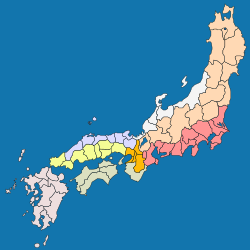Gokishichidō
Gokishichidō (五畿七道, literally, five provinces and seven circuits) was the name for ancient regions of Japan starting in the Asuka period.[1] Imperial government of Japan was divided into large regions made up of several provinces.
Regions
The Gokishichidō counted the five provinces in the Kinai (畿内) or capital area as one region.[2] In addition, there were seven "circuits" (道, dō) in an organizational system which was imported from China in the 7th century. Each of the "circuits" or do was a region which had several provinces within it.
Over centuries, the government functions of the Gokishichido became less important. However, the traditional seven circuits (七道, Shichidō) remained cultural markers.
Core
Under the Gokishichido system, the central provinces were considered to be a core region. These lands are called the Kansai region[3] or Kinki[4] or Kinai.[5] The five provinces included:
- Izumi Province,[1] now the southern part of Osaka Prefecture
- Kawachi Province,[6] now the southeastern part of Osaka Prefecture
- Settsu Province,[6] now the northern part of Osaka Prefecture, including the city of Osaka, and parts of Hyōgo Prefecture
- Yamato Province,[6] now Nara Prefecture
- Yamashiro Province,[6] now the southern part of Kyoto Prefecture, including the city of Kyōto
Circuits
Under the Gokishichido system, there were seven roads which connected the imperial capital with all of the provincial capitals. The land around each of the roads was called by the same name as the road, including
- Hokurikudō,[7] northeast along the coast of the Sea of Japan
- Nankaidō,[8] southern side of the Seto Inland Sea
- Saikaidō,[1] the southern islands
- San'indō,[9] west coast of the Sea of Japan
- San'yōdō,[9] northern side of the Seto Inland Sea
- Tōkaidō,[10] east coast of the Pacific Ocean
- Tōsandō,[10] northeast through the Japanese Alps
Related pages
References
- ↑ 1.0 1.1 1.2 Nussbaum, Louis-Frédéric. (2005). Goki-shichidō" in Japan Encyclopedia, p. 255.
- ↑ Gokishichidō is a compound word made up of Goki (五畿, "five provinces in the capital region") plus Shichidō (七道, seven circuits)
- ↑ Nussbaum, "Kansai," p. 477; excerpt, "Region between Osaka, Kobe and Kyoto without well-defined borders (as opposed to the term Kinki").
- ↑ Nussbaum, "Kinki," p. 522.
- ↑ Nussbaum, "Kinai," at 521; excerpt, "This region is still called Kinai, though its area now corresponds only vaguely to the provinces it once encompassed."
- ↑ 6.0 6.1 6.2 6.3 Gilman, Daniel Coit and Harry Thurston. (1907). "Japan," in The New International Encyclopædia, Vol. 11, p. 132.
- ↑ Titsingh, Isaac. (1834). Annales des empereurs du japon, p. 66 n2
- ↑ Titsingh, pp. 65-66 n3.
- ↑ 9.0 9.1 Titsingh, p. 65 n3.
- ↑ 10.0 10.1 Titsingh, p. 57 n1.

